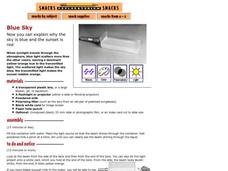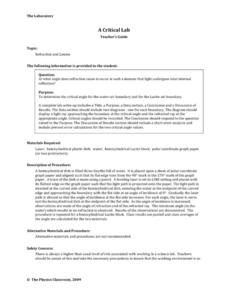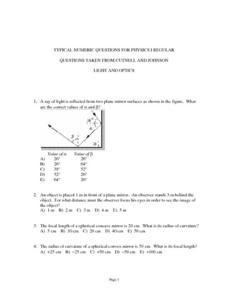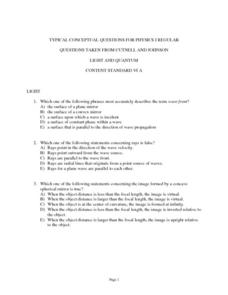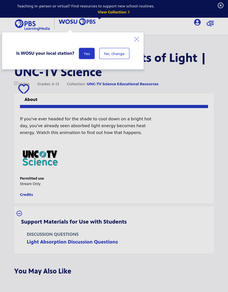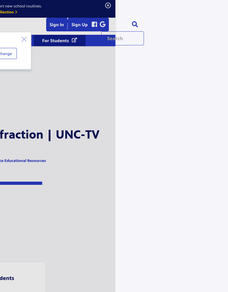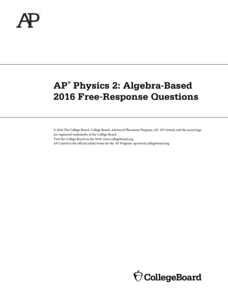Core Knowledge Foundation
Light and Sound Tell It Again!™ Read-Aloud Anthology
Light and sound are the running themes of a read-aloud anthology. Over three weeks, third graders listen to discuss readings in preparation for completing extension activities. Pupils work through the writing process to compose an...
Rice University
College Physics for AP® Courses
Take a look at an organized physics course. The 34-section electronic textbook covers material in AP® Physics 1 and 2. Teachers use the text to supplement lectures and have the class work through the labs. Each section contains...
Physics Classroom
Law Enforcement - Refraction
Pupils apply their knowledge of refraction to four different sets of challenges. Each of the first three focus on one variable's impact on the direction of bending. The fourth combines variables for greater challenge.
Science 4 Inquiry
Trick or Science: Catching the Light
Your class might be surprised to learn that mirrors have been around since the first century AD! Young scientists explore reflection and refraction of light through a series of challenges. They use this knowledge to design their own...
CPO Science
Physics Skill and Practice Worksheets
Stop wasting energy searching for physics resources, this comprehensive collection of worksheets has you covered. Starting with introductions to the scientific method, dimensional analysis, and graphing data, these skills practice...
Exploratorium
Laser Jello
The concepts of refraction and reflection gel with your physical science class during this colorful exploration. Shining lasers through Petri-dish-shaped gelatin desserts, they will notice how the light travels and bounces off the sides....
Exploratorium
Blue Sky
Use a container full of water as a prism and show that as light is bent, the individual colors from different wavelengths become visible. This explains why the sky appears to be blue midday, and why as the sun nears the horizon, it looks...
Scholastic
Study Jams! Light Absorption, Reflection, & Refraction
Zoe and RJ are trying to photograph an egret on a lake, but they are having trouble with the lighting. Reflection, refraction, and absorption are explored through their thoughtful dialogue so that your physical scientists are illuminated...
Physics Classroom
A Critical Lab
Physics lab groups finagle with laser lights to determine the critical angle of refraction for both water and Lucite. Because there are no detailed steps or an answer key for this enlightening exercise, an inexperienced physics...
Curated OER
Typical Numeric Questions for Physics I - Light and Optics
Nineteen word problems dealing with frequency, speed, reflection, and refraction of light are provided here. Empower your physics masters to manipulate equations for computing angles, focal lengths, image heights, and more! This is a...
Curated OER
Typical Conceptual Questions for Physics I - Light and Quantum
This is a stellar overview of everything light and quantum! There are 30 multiple choice questions, none of them requiring any mathematical computation. There are a few diagrams to analyze: light rays striking reflective and refractive...
Curated OER
Take-Home Midterm Exam #3
The University of Hawaii has published a vast collection of midterm and final exams for their Physics 152 course. This particular exam offers a variety of assessment methods, and covers the topic of electromagnetic radiation....
American Institute of Physics
The Black Scientific Renaissance of the 1970s-90s: African American Scientists at Bell Laboratories
A two-part instructional activity asks young scientists to research the contributions of African American scientists at Bell Laboratories. After presenting their findings, class members watch two demonstrations that introduce them to...
PBS
Light Absorption: Effects of Light | UNC-TV Science
Beat the summer heat by exploring the properties of color. Scientists view a video explaining the relationship between light absorption and energy transfer using variables including intensity, time, and wavelength. A multiple-choice...
PBS
Reflection and Refraction | UNC-TV Science
Uncover the exciting interactions of light energy and matter ranging from color to optical illusions. Participants explore color using red and green apples, differences between reflection and refraction, and descriptions of related...
American Museum of Natural History
See the Light
It's time to see the light! Scholars perform three different experiments with light to reveal properties using a great remote learning resource. The pupils see how light reflects from a surface and refracts through different materials....
College Board
2016 AP® Physics 2: Algebra-Based Free-Response Questions
While AP Physics 1 counts as an introductory college Physics course, AP Physics 2 counts as a second-year college Physics course. Help scholars prepare for this more advanced college-level test with questions from previous assessments...
National Nanotechnology Infrastructure Network
Understanding Wave Motion - Slinky vs. Snaky: Which Spring is Dominant?
Ride the wave to an understanding of refraction! The first in a series of two inquiry-based lessons challenges learners to create transverse waves with two different types of springs. As their wave hits an object, they observe the change...
Cornell University
Light Waves: Grades 9-12
Explore the behavior of light waves with a lab activity. Scholars build new vocabulary through experimentation and observation. Using different mediums, they model reflection, refraction, transmission, diffusion, and scattering of light.
Cornell University
Light Waves: Grades 6-8
Explore the behavior of light with different materials. Collaborative groups determine whether certain materials absorb, reflect, diffract, or transmit light waves. They then measure the angle of incidence and angle of reflection.
CK-12 Foundation
Diamond Cut
How do jewelers tell the difference between diamonds, glass, and cubic zirconia? A sparkling simulation demonstrates how to use a ray of light to determine the substance and ideal shape for a diamond. Scholars control the material,...
CK-12 Foundation
Least Time
What is the fastest way to get from point A to point B if you are going through two different mediums, such as air then water? Scholars explore the way light travels through air, water, acrylic, glass, and diamond as they answer this...
Columbus City Schools
Earthly Waves
How did scientists discover what lies beneath the earth's surface? Dig a hole? X-ray vision? Guide your class through the types of seismic waves and how these waves helped shed light on Earth's many layers. The included resources provide...
PHET
Geometric Optics
What would happen if your entire world was flipped upside down? In addition to changing the distance and size of an object, lenses flip the image upside down. The simulation allows scholars to vary the object, move the object, move the...








